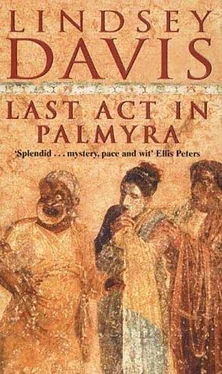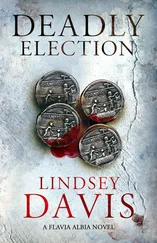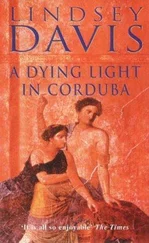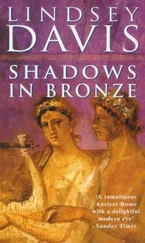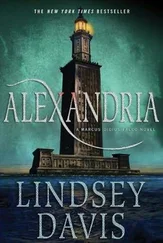Lindsey Davis - Last Act In Palmyra
Здесь есть возможность читать онлайн «Lindsey Davis - Last Act In Palmyra» весь текст электронной книги совершенно бесплатно (целиком полную версию без сокращений). В некоторых случаях можно слушать аудио, скачать через торрент в формате fb2 и присутствует краткое содержание. Жанр: Исторический детектив, на английском языке. Описание произведения, (предисловие) а так же отзывы посетителей доступны на портале библиотеки ЛибКат.
- Название:Last Act In Palmyra
- Автор:
- Жанр:
- Год:неизвестен
- ISBN:нет данных
- Рейтинг книги:5 / 5. Голосов: 1
-
Избранное:Добавить в избранное
- Отзывы:
-
Ваша оценка:
- 100
- 1
- 2
- 3
- 4
- 5
Last Act In Palmyra: краткое содержание, описание и аннотация
Предлагаем к чтению аннотацию, описание, краткое содержание или предисловие (зависит от того, что написал сам автор книги «Last Act In Palmyra»). Если вы не нашли необходимую информацию о книге — напишите в комментариях, мы постараемся отыскать её.
Last Act In Palmyra — читать онлайн бесплатно полную книгу (весь текст) целиком
Ниже представлен текст книги, разбитый по страницам. Система сохранения места последней прочитанной страницы, позволяет с удобством читать онлайн бесплатно книгу «Last Act In Palmyra», без необходимости каждый раз заново искать на чём Вы остановились. Поставьте закладку, и сможете в любой момент перейти на страницу, на которой закончили чтение.
Интервал:
Закладка:
Gradually the rocky features diminished; boulders gave way to stones; the stones, which had spread the landscape like acres of roughly chopped nuts on a cooking board, turned into scatters, then were lost altogether in rich, dark, arable soil supporting wheat fields, vineyards and orchards. The Nabataeans conserved their meagre rainfall with a system of shallow terracing on each side of the wadis: wide shelves of ground were held back by low walls some forty or fifty feet apart, over which any surplus water ran off to the terrace below. It seemed successful. They grew wheat as well as barley. They had olives and grapes for oil and wine. Their eating fruit consisted of a lush mixture of figs, dates and pomegranates, whilst their most popular nuts – amongst a handsome variety – were almonds.
The whole atmosphere was different now. Instead of long nomad tents, hump-backed as caterpillars, we saw increasingly pretty houses, each set within its garden and smallholding. Instead of free-ranging ibex and rock-rabbits, there were tethered donkeys and goats.
Once we hit Bostra we were supposed to be meeting up with the remainder of Chremes' company. The group Helena and I had met in Petra were the chief members of the troupe, mainly actors. Various hangers-on, with most of their stage equipment, had been left behind in the north, which did seem friendly, in case the rest found a hostile welcome in the mountains. As far as the murder was concerned, I could virtually ignore them. It was on the first group that I needed to concentrate.
Quite early in the trip I had asked Chremes, 'Why did Heliodorus really go for that walk?' The scenario was still bothering me.
'It was like him to wander off. They all do it – minds of their own.'
'Was it because he wanted a drink, quietly, on his own?'
'Doubt it.' Chremes shrugged. He showed a distinct lack of interest in this death.
'Someone went with him anyway. Who was it?' A long shot, since I was asking the name of the killer.
'Nobody knows.'
'Everyone accounted for?' Needless to say, he nodded. I would check that later for myself. 'Someone else must have fancied a tipple though?' I pressed.
'They'd be out of luck then. Heliodorus never reckoned to share his jar.'
'Might the companion have had his own jar – or goatskin -that Heliodorus had his eye on?'
'Oh yes! That makes sense.'
Maybe the playwright had had an acquaintance nobody else knew about. 'Would Heliodorus have made friends with anybody in Petra, anybody outside your group?'
'I doubt that.' Chremes seemed fairly definite. 'The locals were reserved, and we don't mix much with merchants – or anyone else. We're a close-knit family; we find enough squabbles among ourselves without looking outside for more trouble. Besides, we hadn't been in the city long enough to make contacts.'
'I heard him going up the mountain. I felt he knew the person, he was with.' Chremes obviously realised where my questions were heading. 'That's right: what you say means he was killed by somebody from your group.'
That was when Chremes asked me directly to keep my eyes and ears open. He did not exactly commission me; that, with a fee at the end of it, would have been too much to hope for. But despite his initial reluctance to involve himself, if he was harbouring a killer he wanted to know who it was. People like to feel free to insult their companions or let them pay all of the wine bill without having to worry that it could annoy the kind of man who shoves his travelling companions face down in cold water until they stop breathing.
'Tell me about Heliodorus, Chremes. Did anyone in particular dislike him?' It had seemed a simple question.
'Hah! Everyone did!' scoffed Chremes.
That was a good start. The force with which he said it convinced me that every one of the group from Petra must be a suspect for killing the playwright. On the journey to Bostra, therefore, Helena and I had to think about all of them.
Chapter XIV
Bostra was a black basalt city built in this blackly ploughed land. It flourished. It had commerce, but it generated much of its own prosperity. There was a fine town gate in distinctly Nabataean architecture, and the King owned a second palace here. To Romans it was alien in flavour – yet it was the kind of city we understood. Irascible donkey-drovers cursed us as we tried to decide where we were going. Shopkeepers looked out from ordinary lock-ups with calculating eyes, shouting at us to come in and see their merchandise. When we arrived, near evening, we were greeted by the familiar scent of woodsmoke from baths and ovens. The tempting odours from hot-food stalls were spicier, but the reek of the leather tannery was as disgusting as any at home, and the stuttering lamp oil in the slums smelled just as rancid as it does all over the Aventine.
At first we were unable to find the rest of the company. They were not at the caravanserai where they had been left. Chremes seemed reluctant to make enquiries openly, from which Helena and I gathered it was likely there had been trouble in his absence. Various members of our group set off to look for their colleagues in the city while we guarded the waggons and luggage. We set up our tent with Musa's silent help. We ate supper, then sat down to wait for the return of the others. It was our first chance to talk over our findings so far.
During the journey we had managed to survey individual members of the group by judiciously offering lifts on our waggon. Then, when Helena grew weary of my efforts at controlling our temperamental ox, she hopped off and invited herself into other transport. We had now made contact with most of them, though whether we had also made friends was less certain.
We. were considering everyone for possible motives -females too.
'A man did it,' I had explained cautiously to Helena. 'We heard him on the mountain. But you don't have to be cynical to know that a woman may have provided his reason.'
'Or bought the drink and devised the plan,' Helena agreed, as if she herself regularly did such things. 'What sort of motive do you think we are looking for?'
'I don't believe it can be money. No one here has enough of it. That leaves us with the old excuses – envy or sexual jealousy.'
'So we have to ask people what they thought of the playwright? Marcus, won't they wonder why we keep enquiring?'
'You're a woman; you can be plain nosy. I shall tell them the killer must be one of our party and I'm worried about protecting you.'
'Load of mule-dung!' scoffed my elegant lady with one of the pungent phrases she had picked up from me.
I had already seen what the theatre troupe was like. We were dealing with a fickle, feckless crowd here. We would never pin down any of them unless we set about it logically.
It had taken most of the trip just to work out who everyone was. Now we sat on a rug outside our tent. Musa was with us, though as usual he squatted slightly apart, not saying a word but calmly listening. There was no reason to hide our discussion from him so we talked in Greek.
'Right, let's survey the tattered cast list. They all look like stock characters, but I'm betting that not one of them is what they seem…'
The list had to be headed by Chremes. Encouraging us to investigate might exonerate him as a suspect – or it might mean he was cunning. I ran through what we knew about him: 'Chremes runs the company. He recruits members, chooses the repertoire, negotiates fees, keeps the cash box under his bed when there's anything in it worth guarding. His sole interest is in seeing that things run smoothly. It would take a really serious grievance to make him jeopardise the company's future. He realised that a corpse in Petra could land them all in jail, and his priority was to get them away. But we know he despised Heliodorus. Do we know why?'
Читать дальшеИнтервал:
Закладка:
Похожие книги на «Last Act In Palmyra»
Представляем Вашему вниманию похожие книги на «Last Act In Palmyra» списком для выбора. Мы отобрали схожую по названию и смыслу литературу в надежде предоставить читателям больше вариантов отыскать новые, интересные, ещё непрочитанные произведения.
Обсуждение, отзывы о книге «Last Act In Palmyra» и просто собственные мнения читателей. Оставьте ваши комментарии, напишите, что Вы думаете о произведении, его смысле или главных героях. Укажите что конкретно понравилось, а что нет, и почему Вы так считаете.
